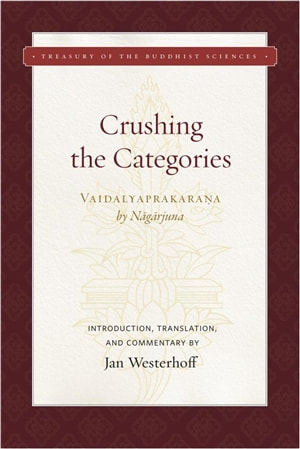
The Vaidalyaprakaraṇa provides a rare glimpse of the sophisticated philosophical exchange between Buddhist and non-Buddhist schools at an early stage and will be of interest to scholars of Buddhist thought, classical Indian Philosophy, and the history of Asian thought.
Belonging to a set of Nāgārjuna’s philosophical works known as the yukti-corpus, the Vaidalyaprakaraṇa is noteworthy for its close engagement with the Hindu philosophers. It refutes the sixteen categories of the Nyāya school, which formed the logical and epistemological framework for many of the debates between Buddhist and Hindu philosophers.
The Sanskrit original of the Vaidalyaprakaraṇa has been long lost, this translation is based on the Tibetan version, adding an extensive analytical commentary. The aim is twofold: to investigate the interaction of the founder of the Madhyamika school with this influential school of Classical Indian thought; and to make sense of how Nāgārjuna’s arguments that refute the Naiyāyika categories are essential to the Madhyamika path in general.
A brief introduction to the book by Robert Thurman is here.
.
Belonging to a set of Nāgārjuna’s philosophical works known as the yukti-corpus, the Vaidalyaprakaraṇa is noteworthy for its close engagement with the Hindu philosophers. It refutes the sixteen categories of the Nyāya school, which formed the logical and epistemological framework for many of the debates between Buddhist and Hindu philosophers.
The Sanskrit original of the Vaidalyaprakaraṇa has been long lost, this translation is based on the Tibetan version, adding an extensive analytical commentary. The aim is twofold: to investigate the interaction of the founder of the Madhyamika school with this influential school of Classical Indian thought; and to make sense of how Nāgārjuna’s arguments that refute the Naiyāyika categories are essential to the Madhyamika path in general.
A brief introduction to the book by Robert Thurman is here.
.